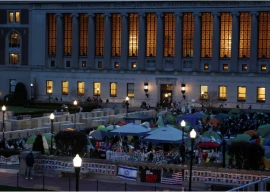
There’s a reason this idea took hold as late as it did. For much of our history, the state tried everything to prove the late major general right. It heaved and heaved against a torrent headed in the opposite direction. It denied Mujibur Rehman in 1970, with heartbreaking results. It reduced the polls to a joke in 1977, and watched people die. It held party-less elections in 1985. It rigged the elections for the same waistcoat-wearing uncles in 2002 that it bribed in 1990.
But nothing unnatural can last forever. After upending 50 years of due process, all it took really, was five years. Five years without smoke and mirrors. This was a stint of genuine civilian rule; the 1990s never was. In just five years, less than that even, the traditional parties were considered untenable, and a third option was born. Imran Khan’s Pakistan Tehreek-e-Insaf (PTI) rose to the occasion, bringing an entire generation out of apathy.
Signs of a thinking electorate have been around us a while, not that our elite pays much heed. The urban middle class is mocked as either cute or clichéd — the conceit felt towards our poor runs even deeper. Rural electorates, it’s always presumed, don’t want big ideas. They want basic facilities, or protection from local thugs, or a job for a nephew. Essentially, patronage.
But that had never been the extent of people’s aspirations. Since nothing else was offered, the discourse was never allowed to improve. It has been evident, even before the PTI began promising a Naya Pakistan, that people aspired to greater things. If the average voter sought only the politics of patronage, of thana-katchehri, of better roads and cleaner pipes, the Chaudhrys of Gujrat would still be in Islamabad. The Chaudhrys had a knack for deep-fried Punjabi constituency politics. On a federal level, they were close to the establishment and adored by the bureaucrats, the opposition was reeling, and they led a legion of heavies yet to lose even once. But in 2008, against all odds, popular opinion didn’t take personalities into account. It voted against party platform, and blew the Q-League away.
Not that relevant quarters noticed. As the only blocs that mattered, the major traditional parties were able to define what governance was meant to achieve between themselves, and that was the sum total of what democracy was likened to be.
But as we have found out thrice over, unnatural systems do not last. One-eighty million people are not meant to be dumbed down. Governance is dreaming about a better life. And it’s about ideas and manifestoes, about economics and justice and civil freedoms. But the major traditional parties did not campaign much by way of transformational change, or institution-building, or structural reform. They spoke little of electoral message, or of the country their children would inherit.
That is when Imran Khan became the solution; a man easy to caricature, and impossible to explain. A man who waded into the muck of our political arena and spoke of reforming the economy, education and industry, and detailed how he would do it. A newcomer who promoted what veterans had yet to touch: women’s participation, the environment, rights for the disabled. His Pakistan is friendly with India, Saudi Arabia and Iran in simultaneity, but shoots down every last child-murdering drone. It is an idealism Pakistan is starved for.
Most hopefully, his party is devoid of the ethnic mess that plagues us. It is the PTI that steams into Quetta and raises the Pakistani flag, rather than Sardar Akhtar Mengal flying in from Dubai to be crowned the latest saint of Baloch nationalism. Unlike Asif Zardari, it plays no Sindh card. And it is the PTI leader who says, “I take your name, Lashkar-e-Jhangvi … and there is no worse enemy of Islam than you.”
Imran Khan’s past record has kept him in the nation’s consciousness. Though the press cannot keep itself from hyphenating “cricketer-turned-politician”, his most indelible mark, even as he lies hurt, is on the part of Pakistan he restored to health. Shaukat Khanum Memorial Cancer Hospital captures the spirit of all that Pakistan can be. Yes, building hospitals has little bearing on running the government; his party may not win come May 11, and may not deliver even if it does. But we owe him for advancing the national conversation, and, with his party becoming a vibrant third force on our political landscape, this truly vindicates the genius of the Pakistani people.
That it took this long for us to believe it is also a commentary on the awfulness of the political class, and how accustomed we are to reveling in that awfulness. It took a while for us to realise, hearts hardened with each disappointment, that it may yet be possible that our heroes and leaders could be one and the same.
Published in The Express Tribune, May 9th, 2013.
COMMENTS (41)
Comments are moderated and generally will be posted if they are on-topic and not abusive.
For more information, please see our Comments FAQ


































1713853507-0/MalalaHilary-(2)1713853507-0-270x192.webp)








Iskandar Mirza was right. :(
What a fantastic piece.
Do u think green environment, women's participation and rights of disabled could help us. well all these things matter to developed nations and as a matter of fact we are still a developing country with a lot of things yet to be done! There are bigger challenges faced by Pakistan right now than empowering women or saving the environment!
@junaid: PMLN is PPP
"It took a while for us to realise, hearts hardened with each disappointment, that it may yet be possible that our heroes and leaders could be one and the same."
I dream of that day. In Naya Pakistan, InshAllah.
Imran Khan is not genius, we are stupid nation, always looking towards others to solve our problems. As nation we are incompetent and other take benefit from this.
I love your writing always asad. clarity of thought, knowledge and extremely well written. This article is great not only because im a pti supporter but because u express yourself so well and as the youth, you and i, are the relevant players and deciders of the destiny of our country. when we say enough, it really is enough.
@its an op ed piece. reflects asad's opinions. not the paper's. and et has neverr been biased towards pti. so please.
Assalamoalaykum everyone,
Cheer up sad heart and sees ripening Behind the clouds sun is still shinning
Country is developed by vision and working hard to achieve the vision. Regretfully, after Muhammed Ali Jinnah Pakistan didn’t get any visionary leader. The mess we have now is due our 64 years bad selection in elections. It seems to me whole nation has to re-start again with zero. Accepting our mistakes and bad decisions and asking ALLAH’s forgiveness. Well, we already tried PPP, PML-N, PML-Q, MQM, ANP and also Pakistan army generals in the past and nothing work out. So it is better to close the non-work out chapters and begin a new chapter with Imran khan. ALLAH help and guide Imran Khan and his PTI team to lead Pakistan in good direction. Amen. Shahid Iqbal
I am disappointed to see Express Tribune becoming a PTI propaganda bulletin. For the past weeks, its bias in favor of Imran had been clearly evident. But today, in allowing this article, the paper has crossed all boundaries of journalistic integrity, objectivity and fairness.
Very well thought out piece
@author and all supporting PTI, I find it absurd that you all are not taking into consideration your Establishments role in governance of pakistan. ALL previous elected governments had to OBEY the establishment and have worked to there best based on that condition. I could not see ONE ACTION of PTI which can prove that they are going to be independent. More over there are lot of senior PTI member who were erstwhile from other parties, how have they become BEST for pakistan just by changing there party names.
Need some good articles for your own sake.
So we've seen the shenanigans of PMLs and PPP. Can the 'naya Pakistan' waalahs please just start obeying every law, starting woth traffic laws and then move onto paying their taxes and stop bribing to get their rightful or otherwise tasks done?
That, proudly publicised, with names and dates will be the start of the 'naya Pakistan'. Everything else as in 'love him ', 'savior of Pakistan' etc. is just bombastic rubbish
As a PPP supporter let me just say, a beautifully written article.
Admit or not, IK is the one who moved this whole nation for the election especially the youth. He is the man of his words.
All the seudo intellectuals criticising IK day in & out, please share if not PTI then which other non tested sensible patriotic Pakistani politician you have in mind whom we cant vote & who would not rip us apart with his corruption in the next 5 years?
And as for 'Aman', it is the writer's discretion how he chooses to use the space he is allowed. For what it's worth, he's compressed the problem at hand quite artfully.
lets wait and see... after this election pakistan will lose its credentially worldwide.
Finally, a comprehensive overview (and censure) for the standard argument about not trusting the people of Pakistan with the burden on the vote. Balanced and not apologetic. Sensibly dealt with the kind of idealism Pakistanis need. Well-written and nuanced is a given with Mr Asad. Fantastic job!
I am disappointed to see Express Tribune becoming a PTI propaganda bulletin. For the past weeks, its bias in favor of Imran had been clearly evident. But today, in allowing this article, the paper has crossed all boundaries of journalistic integrity, objectivity and fairness.
Vote for Pakistan, Vote to PTI.
"His Pakistan is friendly with India, Saudi Arabia and Iran in simultaneity, but shoots down every last child-murdering drone. It is an idealism Pakistan is starved for."
Then everybody lived happyly ever after.If you have a memory of a gold fish, then by all means, put a stamp on whichever party is bribing the public, with soft loans, bullet trains, or be sentimental, and vote for the Shaheeds. If however, you have an iota of care about your country, then there is no other choice but PTI. This is a vote for the survival of Pakistan, not for any political party.
That was a prettyyy awesome article! well done!
This was an important and necessary article. What you have said is so true but in the overall hype of the elections the fact that even if the PTI comes in third it will prove to be a game changer in our political landscape and if that is not important then nothing is.
@Acorn Guts: OK - So we have clearer promises from Nawaz and Zardari lot - correct?
Good article:) I thoroughly agree. People arent idiots. Love Imran Khan.
Is Pakistan has got a real leader, who has the potential to change?....Actually NOT YET. Actually the problem with Pakistani nation is that it can’t analyse the history; can’t understand the nature of the game of power politics. Basically it is generation gap, self-interest and incompetency that significantly favour the nation to be fool by the same player. Today the history is repeating itself accordingly with the same strategy; who supporting and propagating PTI today, who trying to establish PTI as alternative of APML (Musharraf) and other attempts, who backup Qadderi to build up a pressure group it certain level, who have been indirectly playing the chess but basically using various tactics to be in power is the same who decades back have been used PPP, MQM, PML, PMLQ, others and now PTI…... The real power and democracy has not been handed over to the nation yet and not the nation is that much competent to manage. Yet some forces working behind, still some forces can’t trust the nation; still the great game is in progress and still many doesn’t understand the real players. Remember like the previous IK can’t bring any change but will do what the romans do.. But for how long; The real revolution will certainly coming one day
Wow! Amazingly well written! Is that @Aman guy for real? @Aman, you should definitely read it! And whats with this "ohhh.. don't want to read history". Don't say that! He built the rest of his article beautifully on the "history" reference. Its not a tweet nor a press release. Its an article where the author is trying to express his opinion. I highly highly recommend that you read it.
As for the author, keep writing! I loved how it felt like I was being told a story where i pause and ponder over whats been said. Then continue with the story. Well done!
Great work buddy, I'm not a PTI supporter but I think that Imram Khan has invigorated the national political discourse and woken other parties from their slumber. He has gotten people otherwise totally indifferent to politics to think about bringing change through the ballot.
People who criticize Khan's "idealism", regarding social/economic justice, governance etc, don't realize that you only improve when you begin to ponder the (seemingly) impossible. If you take things as they are, there is zero chance for change; if you start wondering -be it the outrageous- you create at least the potentiality for betterment.
wwooooowww i likze ur article its amazin and especially since it about imran khan hes so kewl, and dont listens to Aman your article is rox because your topic rox. AEE AEE PTI!!!
You are just trying to gain some attention but anyways who cares about this article. InshaALLAH Imran Khan Will Win and fulfill his promises! Vote For Change! Vote for Pakistan Khan!
Great article, well thought out. Imran has definitely generated enthusiasm which did not exist five years ago. I think the people are empowered enough that we will most likely see other new parties emerge, which will most definitely get rid of the status-quo if IK doenst. Otherwise I wish the best to PTI and it's supporters.
What the author really means to say is vote PTI if you want to save Pakistan :)
I just don't get this whole hope business. Pakistan has so many problems. I don't claim to understand them all. But the part that I do understand is the economy and that is in terrible shape and it will take a minimum of 5 years to fix. In that time period there will be much pain. So really it doesn't matter who is elected. Even the most competent people will take 5 years at least to fix things. 10 years or more if you want a long term fix to problems like power cuts.
@Aman: Well, it's somewhat off-putting when one jumps to conclusions about an article without reading it. You're guilty of judging a book by its cover in this instance. Let the editor judge the worthiness of an article for publishing - this isn't English Language class!
An excellent article; whether people support the PTI or not, it is evident that Imran Khan's relentless campaigning has helped galvanize this generation into action and widened political debate and participation. It would be a moment of triumph for Pakistan if 'change' is voted into power. An event that may even surpass the PPP coming into power in the 1970s. These are desperate, but exciting time.
@Asad Rahim Khan: The gist of your article is germane and beautiful:
Five years without smoke and mirrors. This was a stint of genuine civilian rule; the 1990s never was. In just five years, less than that even, the traditional parties were considered untenable, and a third option was born. Imran Khan’s Pakistan Tehreek-e-Insaf (PTI) rose to the occasion, bringing an entire generation out of apathy.
You have very cogently articulated your thought that the Pakistani political field is very fertile and given the right conditions democracy will not only strengthen its' roots but that the Pakistani people are pre-disposed to become a mature electorate fully capable of making the right decisions. Coming from a young Pakistani scholar the message could not have been more potent and timely.
PMLN or PTI... say NO to PPP!
Imran is good but he needs some clarity in his promises in his approach. There is just too much uncertainty, off-the-cuff jibes, calling his opposition names and "grass is always greener on the other side" attitude for my liking.
Still the best hope for Pak I must admit.
Sorry Mr. Asad Rahim Khan. You have a catching heading for the article. The article itself may or may not be interesting. Never got to read it fully. Who cares. Not interested.
Rather than focusing on the issue at hand, when an article starts with the whole darn history of Pakistan, it throws me off.
Its not a book. You have limited words allowed, Use it wisely - keep in mind you have a huge competition nowadays of electronic media.
Just a friendly comment.